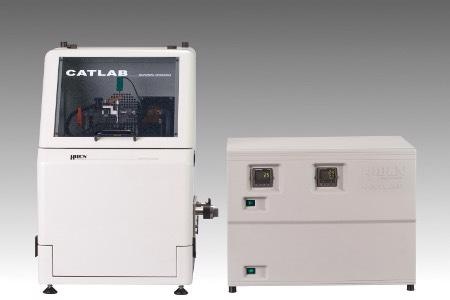Temperature programmed oxidation (TPO) is a material characterization process that heats a sample of an element or compound, then, in the thermal excitation that takes place it can establish the oxidation. This is important when investigating catalysis. The nature of these measurements requires a heating element, usually in a furnace or microreactor, that can increase the temperature of the sample in precise steps and to high values; for example, a step size of 1-20 °C up to 1000 °C. This is used alongside an integrated mass spectrometer to analyze any catalytic activity in real-time, as a flow gas is passed over the sample during the pre-programmed temperature rise.

Typically, temperature programmed oxidation is used to investigate the oxidation of organic compounds using metal oxide catalysts. It can record numerous catalytic reactions that give significant insight into their operation. Its primary fields are that of research and development of alternative fuels, and chemical manufacture.
For example, hydrogen is currently being explored as a potential candidate as the fuel in highly efficient, clean fuel cells for electric vehicles, that are much less polluting than traditional fossil fuel powered automobiles. However, the decrease in pollution at the car end is in danger of being negated by the formation of the hydrogen in the first place via natural gas reformation. The process is known as Steam-hydro carbonation and works by reacting a natural hydrocarbon such as methane (CH4) with high pressure steam of up to 1000C in the presence of a catalyst. The end product is hydrogen that goes on to be used in various industries, along with the aforementioned fuel cell. The key issue with this reformation is that it has extremely high energy demands, that impact the gains made by the switch in fuels.
Being such an energy intensive process, there has been a lot of research done into reducing this demand, with studies done on partial oxidation processes, as well as improving the existing manufacture of hydrogen. This could be done by augmenting existing reformation processes with energy that comes from renewable sources, but first requires extensive research into the materials used for catalysis. This is why TPO is such an important technique, with the ability to provide dynamic and accurate data in this field.
TPO Mass-Spectrometers from Hiden Analytical
The Hiden Analytical CATLAB-PCS is a modular bench-top analytical system, capable of performing TPO with seamless data acquisition from the in-bed thermocouple. This allows researchers to monitor catalyst temperature directly. The system is purpose-built for TPO studies and allows for automated and repeatable catalyst characterization.
The integrated microreactor CATLAB-PCS module system has already been prepared for the characterization of nickel-based catalysts for partial oxidation of methane. As an exothermic reaction, it is proven to decrease the energy demands of natural gas reformation because it is a relatively exothermic reaction which occurs at an exorbitantly higher rate than high-pressure reformation.
Using TPO, researchers hope to determine the catalytic properties of the low-cost metal nickel (Ni) with methane, which is stable and active enough to partially oxidize with methane, although there is the risk of it sintering at high temperatures.
Hiden Analytical is dedicated to the production equipment for all areas of TPO research, not just natural gas reformation. With a range of other devices, there is the potential for the further characterization and analysis of reaction mechanisms and oxidation of catalysts for a range of applications. If you would like to find out more, please contact them.

This information has been sourced, reviewed and adapted from materials provided by Hiden Analytical.
For more information on this source, please visit Hiden Analytical.